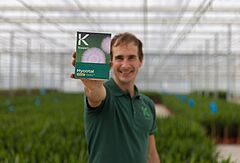


Lecanicillium muscarium is a species of beneficial fungi commonly used in biological pest control. This fungus is known for its effectiveness in controlling various insect pests, including whitefly, aphids and thrips. Lecanicillium muscarium infects its target pests by penetrating their bodies through natural openings or by direct contact. Once inside the pest, the fungus grows and proliferates, ultimately leading to the death of the insect host. This process is often facilitated by the production of enzymes and toxins by the fungus, which weaken the pest's immune system and disrupt its normal physiological functions. Lecanicillium muscarium is frequently applied as a microbial pesticide in agriculture and horticulture, providing a natural and environmentally friendly alternative to chemical insecticides.


Lecanicillium muscarium for pest control
The beneficial fungi Lecanicillium muscarium effectively controls a range of insect pests, including:
These common pests can cause significant damage to crops in agriculture and horticulture. By targeting these specific pests, Lecanicillium muscarium provides a natural and environmentally friendly solution for managing insect populations and safeguarding plant health.


Lecanicillium muscarium product
Mycotal is a bio-insecticide that contains the highly effective blastospores of Lecanicillium muscarium Ve6. This product is the natural solution for whitefly, thrips and aphids in vegetables, ornamentals, nursery trees and soft fruit in protected cultivation. Mycotal is safe and easy to use and can be applied using existing spraying equipment. It is compatible in the tank mix with a wide range of other plant protection products, making it easy to integrate in your current spraying program. An added benefit is that it leaves no residue which helps growers meet the increasingly demanding supply chain requirements. Due to its specific mode of action, Mycotal is safe for beneficial insects, making it a powerful weapon in an integrated IPM program.
How does Lecanicillium muscarium work?
Lecanicillium muscarium controls a variety of insect pests, including whitefly, aphids, and thrips, through a process known as mycoinsecticide activity. When applied to infested areas, the fungus adheres to the bodies of these pests and penetrates their cuticles. Once inside, Lecanicillium muscarium colonizes the pest's body cavities, where it proliferates and feeds on their internal tissues. This invasion weakens the pests, eventually leading to their death. Additionally, the fungus produces enzymes and toxins that further contribute to the demise of the pests. As a result, Lecanicillium muscarium effectively suppresses populations of whiteflies, aphids, and thrips, providing a natural and environmentally friendly method of pest control in agriculture and horticulture.
Best conditions for use Lecanicillium muscarium
The efficacy of Lecanicillium muscarium depends on temperature and relative humidity conditions inside the crop canopy and the timing of application. The following conditions are required:
- Lecanicillium muscarium requires sufficient humidity inside the crop canopy for several hours after application for the spores to germinate and infest the pest
- Spray at late afternoon and/or early evening








